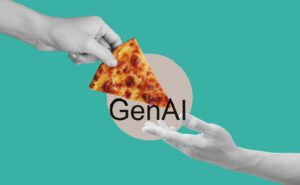
A Smarter Slice: Domino’s and MSFT in GenAI Hookup

(Sasin-Paraksa/Shutterstock)
Don’t look now, but your next pie could come with a tasty slice of generative AI.
Microsoft and Domino’s Pizza yesterday unveiled a partnership that will see the new artificial intelligence technology incorporated into the pizza giant’s operations. The plan hinges around the development of a GenAI-powered assistant that will help Dominos store managers and staffers keep the pizza operation flowing smoothly.
Powered by Microsoft’s Azure OpenAI Service, the pizza bot will not only help store managers keep track of inventory and streamline staff scheduling, but will also help streamline pizza prep and quality control.
As part of the five-year partnership, Microsoft and Dominos will fund an Innovation Lab where engineers will fine-tune the development of the “smart store and ordering innovations” using GenAI technology. Customers will begin to taste the fruits of this GenAI labor within six months, the companies say.
“”We are thrilled to co-innovate with Microsoft using Azure AI technology to advance the future of pizza ordering and store technology powered by secure, connected data and simplified processes,” Kelly Garcia, Domino’s executive vice president and chief technology officer, said in a press release.
This is not the first time that fast food operators have dipped into the technological fryer to improve operational efficiency. Wendy’s, the purveyor of the square burger, has been at the vanguard of fast-food adoption of GenAI.
Earlier this year, Wendy’s announced a partnership with Google to develop new tech for its drive-thrus. Dubbed Wendy’s FreshAI, the system features a chatbot that will talk to customers and take their orders. The system was slated to be tested at a restaurant in Ohio over the summer.
But Wendy’s can’t take credit for the world’s first burger bot. That delicious title likely goes to Denver’s Good Times Burgers and Frozen Custard, which adopted AI technology to take drive-thru orders, as we reported back in 2019.
McDonalds has also been at the forefront of big data tech, including with self-service kiosks as well as back-office automation. In 2019, the burger giant spent $300 million to buy an Israeli software company that specializes in personalization and decision logic. The goal was to customize the contents of drive-thru menu based on variables like time of day, weather, current restaurant traffic, and trending menu items.
And of course we’d be remiss if we didn’t mention the DOM Pizza Checker, in which Domino’s Pizza franchises in New Zealand and Australia adopted computer vision AI technology to automatically detect flaws with pizzas as they’re coming out of the oven. Over the past couple of years, the DOM has expanded to US stores.
The fast food business would seem to be primed for all forms of automation, including the type provided by GenAI. In January 2024, a new law will go into effect in the state of California requiring fast-food workers to make a minimum of $20 per hour, up 29% from the current $15.50 per hour minimum.
Restaurant owners that oversee 38,000 stores in the state say the new law will force them to reduce jobs through automation, and to close some restaurants. The timing with the maturity of GenAI tech may help to minimize store closures, but only time will tell how the state’s 550,000 fast food workers will fare.
Related Items:
How AI Is Revolutionizing Fast Food































